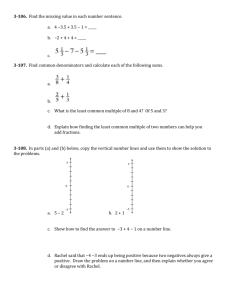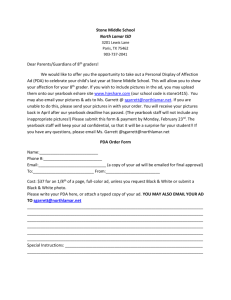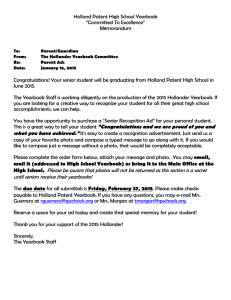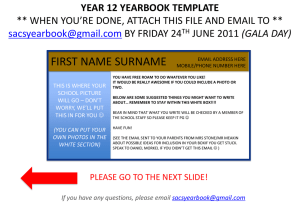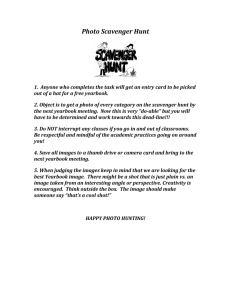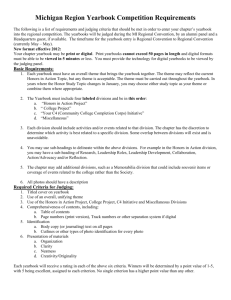ArtSeminars_YearbookDesign_syllabus
advertisement
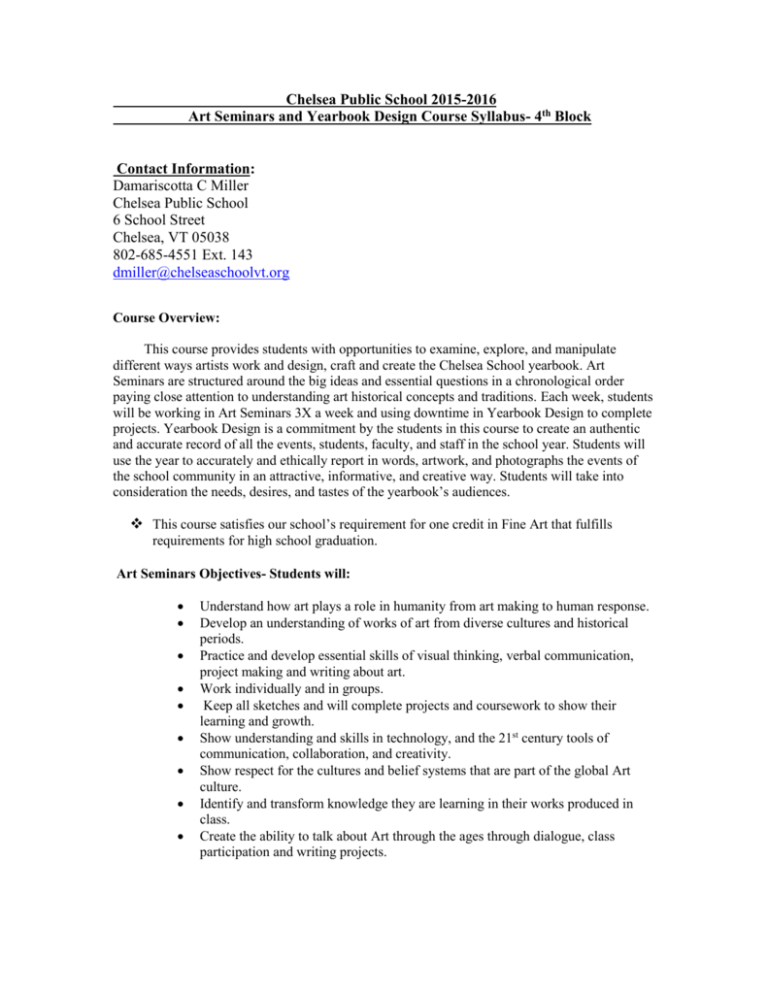
Chelsea Public School 2015-2016 Art Seminars and Yearbook Design Course Syllabus- 4th Block Contact Information: Damariscotta C Miller Chelsea Public School 6 School Street Chelsea, VT 05038 802-685-4551 Ext. 143 dmiller@chelseaschoolvt.org Course Overview: This course provides students with opportunities to examine, explore, and manipulate different ways artists work and design, craft and create the Chelsea School yearbook. Art Seminars are structured around the big ideas and essential questions in a chronological order paying close attention to understanding art historical concepts and traditions. Each week, students will be working in Art Seminars 3X a week and using downtime in Yearbook Design to complete projects. Yearbook Design is a commitment by the students in this course to create an authentic and accurate record of all the events, students, faculty, and staff in the school year. Students will use the year to accurately and ethically report in words, artwork, and photographs the events of the school community in an attractive, informative, and creative way. Students will take into consideration the needs, desires, and tastes of the yearbook’s audiences. This course satisfies our school’s requirement for one credit in Fine Art that fulfills requirements for high school graduation. Art Seminars Objectives- Students will: Understand how art plays a role in humanity from art making to human response. Develop an understanding of works of art from diverse cultures and historical periods. Practice and develop essential skills of visual thinking, verbal communication, project making and writing about art. Work individually and in groups. Keep all sketches and will complete projects and coursework to show their learning and growth. Show understanding and skills in technology, and the 21st century tools of communication, collaboration, and creativity. Show respect for the cultures and belief systems that are part of the global Art culture. Identify and transform knowledge they are learning in their works produced in class. Create the ability to talk about Art through the ages through dialogue, class participation and writing projects. Yearbook Design Objectives- Students will: Understand the responsibilities of appropriate coverage material for our yearbook’s audience. Create a true, authentic, and relevant record of the school community and the school year. Learn the basics of photography composition, apply critical thinking strategies to brainstorm, use writing composition skills, develop organizational skills, and make decisions based on design and coverage of events. Use the skills learned and necessary to plan and create a publication. Conduct research using a variety of sources such as interviews, the Internet, and other publications. Conceive coverage ideas and create multifaceted visual presentations of the material and data for our yearbook. Find a variety of ways to provide a balance of coverage without being biased to any event, staff, or students. Compose all stories accurately providing information that is up to date, honest, and dedicated to promoting the school year. Critique the publication and find its strengths and weaknesses and work towards improving it based on our discussions. Independent artwork or work from other teachers is not a part of this class. The art room is a studio space for students to be working on projects stemmed from the curriculum in Arts Seminars and Yearbook Design. Materials and Resources: Respectful Phone Contracts- attached Art Seminars – all materials are provided including access to the textbooks online, videos, PDF documents, and the 250 images we are studying. Yearbook DesignAdobe Photoshop and Illustrator program, iPads, digital camera (provided). Major Course Projects: Art Seminars projects include creating a digital timeline of Attendance and Discipline: I adhere to the rules as stated in the Chelsea Public School Student Handbook regarding attendance and discipline. I fully expect all students to review the material and follow it. As always, I maintain discretionary rights and will follow up on all issues and concerns. Classroom policies: Come to class prepared to learn and on time. Phones are allowed for taking photos and/or interviewing. Students will sign a Respectful Phone contract that simply states that they will use their phone to promote learning and fulfill project requirements and essentials. The Art room is a safe haven for everyone who enters; adhere to this policy always. Respect yourself and your fellow classmates. Do not use foul language or bring unnecessary attention to yourself in a derogatory way. No hats Do not misuse materials or supplies. Doing so will result in the loss of usage. Do not damage another student’s work. Doing so will result in writing a letter of apology to your classmate and myself signed by parents or guardians. IMPORTANT: I invite any of you who have any disability, either permanent or temporary, or any other special circumstances that might affect your ability to perform in this class, to inform me, so that together we can adapt methods, materials, or assignments as needed to provide equitable participation and success. Weekly Assignment Schedule: I will provide students a weekly schedule that will have weekly updates, class assignments, and due dates for all assignments. Course grading will be based upon the following percentages: Yearbook Design Weekly Rubric- 50% of total Grade Art Seminar Assignments- 50% of total Grade Make-up work: Students will be given point totals for all assignments in Web2School. Students wishing to improve on the point total assigned for projects may continue to work on pieces on their own time rather than in class. I will give fair warning of assignment improvement due dates to students who need to improve their grade. It is students’ responsibility to take the initiative to do this if they choose to. At the end of the quarter, all work will be handed in for final grading before the end of each quarter. Expectations for Students: Students are expected to: Participate in all class discussions and activities Contribute and collaborate on ideas from classmates Follow the Art room rules: We have three rules for the Art room Take care of people Take care of stuff Behave like an artist -What does this mean? Playing and experimenting with art materials are artistic behaviors. Talking about art ideas with classmates is an artistic behavior. Making sketches first and not making sketches first are artistic behaviors. Artistic behaviors look like many things and art is not always being completed in every class or is always being finished. Artistic behavior is unique to each of us. Academic Integrity Policy: We, as members of the Chelsea Middle and High School community value personal integrity and believe all aspects of cheating and/or plagiarism are not ethically or socially acceptable ad will not be tolerated.
